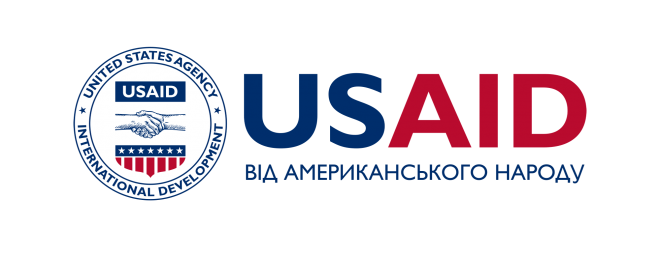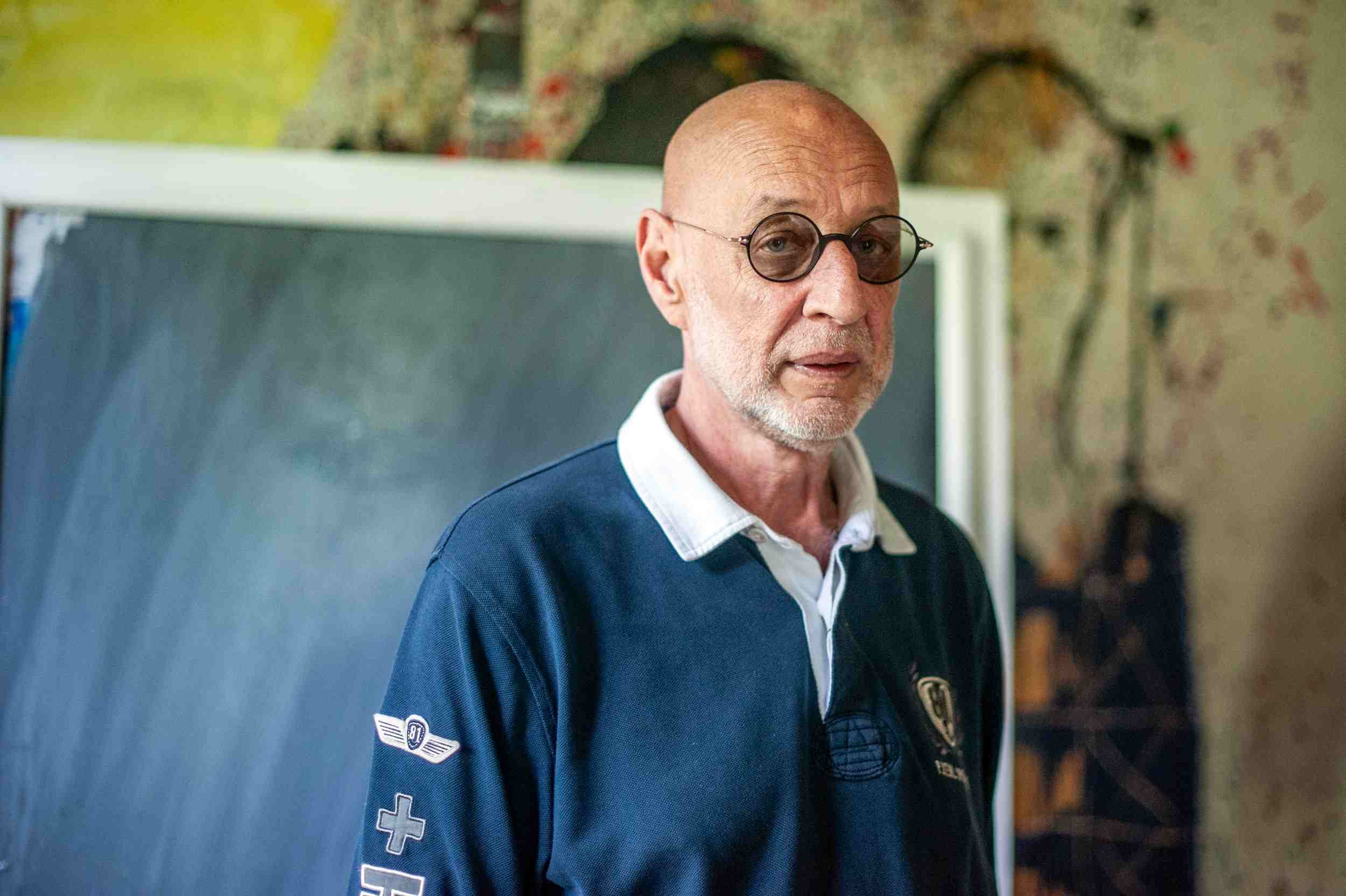Some people still keep old photos, things and birth certificates. Others think themselves globally minded, and for them nationality and roots are just conventionalities with not all that too much to have an impact on their lives. We hang on our lips for each of the stories, for they are unique and the people’s eyes are shining as they are telling of their origin.
For Transcarpathians they always mean complicated and confusing, at times sounding as a true detective story. Ukrainians, Slovaks, Hungarians, Czechs, Romanians, Swabians, Jews, Roma, French, Italians and even Mongols – we are going to tell you of these and more nationalities of our characters.
Vlad Gabda
an artist
His roots: Hungarians, Czechs, Slovaks
At my home two languages were spoken ever since I was a child – Hungarian and Slovakian. At school my language of study was Russian, and there is no-one to blame for it, those were the times. Up until I finished my first year of study I could hardly understand what was spoken about around me.
Everybody calls my mom a Russian, as she was born in Moscow, even though her maiden name was Tyshchenko. My mom’s father was a military officer so they used to move from city to city and finally arrived to Moscow where she was born. After that they moved to Transcarpathia.
My dad’s father was born in Humenné (a city in Slovakia – Editor) but he is a Hungarian. My Slovakian granny completed a Hungarian gymnasium and got registered as a Hungarian due to her own beliefs. She read perfectly in German after completing her studies.
My grandma was an Uzhhorodian of the 4th generation, which means I belong to the 6th one. Most residents of our street spoke Hungarian. When my mom was young and came to live here, in a year she could speak perfect Hungarian. And in some 3 years the elderly Hungarian ladies started consulting her concerning recipes of the Hungarian cuisine.
If they ask me the question – So Mr. Gabda, who are you, in the end? Then my thoughts would be like that: my dad was crying as he heard the Hungarian anthem while I grew up with Russian literature. Of course, Hungarian is my mother tongue, though I do not speak it so well as Russian. My Ukrainian is a bit worse but only when it comes to some technical point. I always do my best to keep communicating in it. By the way, if we consider the skeleton staff of the Transcarpathian art school, and that will be about ten artists, they spoke Hungarian among them. It was only Manaylo who clearly declared he was a Rusyn.
We, Uzhhorodians, have never been worried or embarrassed by any nation or language, for we all consist of those small crumbs. We are used to watching Slovakian TV channels, have been used to it since we were children. I communicate in Hungarian, Russian, Ukrainian, Slovakian, at times Czech. We have never had any national quarrels in our family.
My dad had been offered to move abroad a few times. From what I know, at least three times. One of the proposals came from a rich collector from Canada. He wanted dad to move and launch a workshop with an exhibition gallery at Niagara. Another offer to him was to move to Kosice, with a job and an apartment in the very downtown. But his reply was that he belonged here, his home and ancestors buried here, his garden is growing and he knows it to the very last plum. Dad once said, if you don’t have a motherland, it means you have nothing at all. My sister and I stick to the opinion. We have been offered many times to sell the house, but the very thought is unacceptable for us. It’s simply impossible to lose this garden and the arm-chair where our Dad used to sit. They’re all our lives, our roots. Dad used to fill the whole space around with his art. It was very hard to get through the times when he had left us forever. As long as Mom was alive, we still felt some kind of contact with him and after she had passed away the times grew really dark…
The words “home” and “homewards” are not that simple. I remember as I was serving in the army in Lviv, a year had passed before they gave me a vacation, and it must have been one of the happiest moments in my life when they finally did. After completing the military duty, I returned home, opened the gate secretly, sat under the fir-tree and started watching the kitchen window. Dad and mom were talking over something and then he turned his head and saw me, and then they both turned to me. I will never forget his eyes. That was a miracle.
As I close my eyes, in my mind I can still return to the Bercsenyi Street of the 1970s. The cobblestone road, the stone-paved dykes, the old huts, one and the same yard-keeper sweeping the street every day…I can still clearly see all that.
Oh how I wish that my Uzhhorod, my town would not be destroyed… Sometimes I take a trip to the Slovakian town of Komarno, and it is much like Uzhhorod, even a bit smaller. They never knock down any house, and even if they rebuild it, the façade remains untouched and restored. The things going on in Uzhhorod and in my home Bercsenyi Street, it’s something terrific.
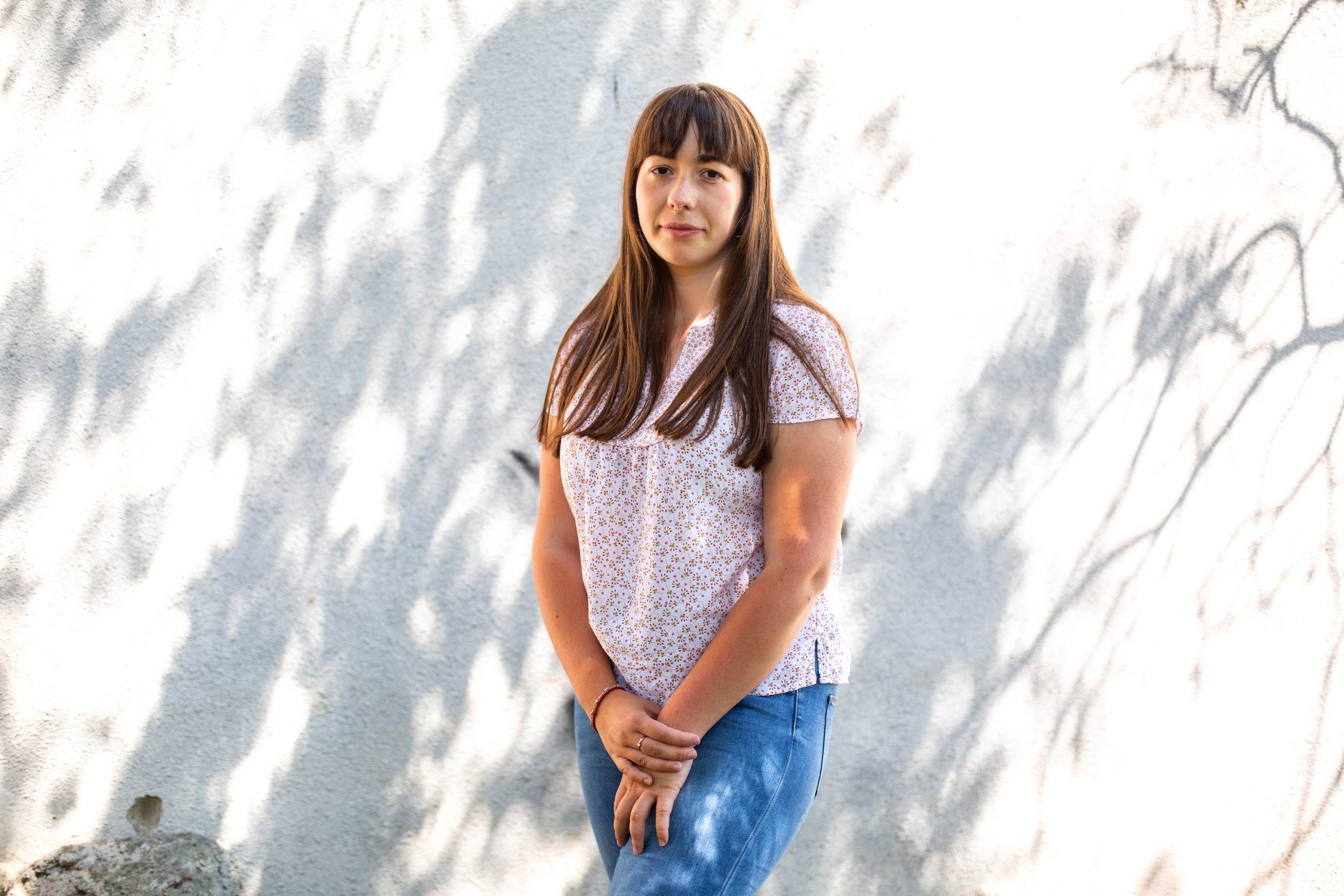
Iris del Soly
A public activist in ecology, a lawyer in ecological field, a participant of a UN ecological summit
Her roots: Italians, Frenchmen, Hungarians
It has always been something rather strange to me, for, even though I was born and grew up in a Transcarpathian village but still I have often had difficulties with other people identifying me even here in Ukraine. They sometimes could not even tell for sure where I come from. As I went for my studies in Lviv, there wasn’t a single foreigner or simply anybody not having a non-Ukrainian first name or last name. I can even remember as once our lecturer in philosophy said something like this: “If you are actually a mixed blood of several nationalities and have been communicating in several languages ever since you were a child, then it means that you cannot identify yourself”. This is just about me – the mix of bloods, and I have been bilingual since I was born. But I am of a different opinion. My brother and I were brought up as children of the world. And that’s how we feel because it’s normal for migration processes to go on throughout the world, uniting people of various nationalities into families. Say, my grandparents still cannot communicate between one another and we have to interpret for them, even though each of our family speaks four or at least two languages. I have always loved having a multinational family. It enriches you in the cultural sense, for we know much more of the world traditions, we travel a lot, and we’re more open to everything new.
I was only 3 weeks old as I was making my first flight abroad. My parents wanted to show me to my grandma and grandpa in France. Actually, it should have happened earlier and my parents were planning to have the childbirth over there but dad wasn’t able to formalize a visa for mom. And now that they already had the documents, I was born in the maternity hospital of the village of Dragovo, which is not there any longer. But due to the fact another of my middle names is Visa. They wouldn’t want to register it but dad just explained it was a Latin god protecting travelers so now I am happy to be Iris Lidia Visa del Sol.
And always as they ask me who I feel myself more of – a Frenchwoman or a Ukrainian, each time I specify through what eyes the person wants to look at the world – positive or negative. Yes, it may be believed that I am a foreigner both here and there but that’s not about me. I feel at home in Ukraine but when I’m passing through Hungary, I am just as well at home in there for my mom is a Hungarian. I feel at home in Italy, for my dad is an Italian by his origin; and finally I am at home in France for my family comes from that country.
My mom’s mother tongue is Hungarian, and in her family everybody’s Hungarian. She comes from Rakoshyno, and I had seen my great-grandpa, her grandpa. And he had never spoken any language except Hungarian. So he used to say that in his life he had had to change his national passport four times, even without leaving his hut.
My dad is a Frenchman of Italian origin. His father comes from the north of Italy, and his mom comes from Sardinia, and even the local folks don’t think it is too much of Italy. So they had both immigrated to Paris where they eventually met and got married and my dad was born there. And still Italian remained as the native language in their family. I got lots of relatives in Italy, most of them being farmers and fishermen.
We all speak in four languages and they don’t have to get mixed. At home we communicate in French, and dad talks to us in French only, while mom only speaks a literary Ukrainian to us. My brother Arsen and I speak French, Ukrainian, English and Russian. Father speaks French, Italian, English and Ukrainian. Mom speaks Hungarian, Ukrainian, French and Russian.
It is rather difficult for us to trace our genealogy because, say, Italians have 3 or four middle names and a last name. So dad has difficulty remembering everybody’s date of birth and names. Yet, as I study Sardinia I realize that the Spaniards once used to be there and Arabs before that. In their turn, Hungarians are related with Mongol-Tatar nomads.
All of our Ukrainian relatives live in Transcarpathia, so we haven’t travelled through the country much, while we have been Italy and France quite often ever since we were children. That’s where we improved our language skills. During the last years, some of our relatives have immigrated to America.
As for French traditions at our home, they show up in the food and the etiquette. My father once worked as a waiter in one of Michelin restaurants and had a training for the specialty, so we knew all the details from our childhood. We have recently had an argument in the morning over my slicing cheese in a wrong way. And dad said: “Iris, what a shame of you not to know how to slice cheese!” (laughing – Editor). Due to our French roots, we have always had cheese at home, – and good wines, too, since dad is a wine steward. As for Italian traditions, we have caught on aperitifs. Every time we don’t see one another, relatives or friends, I mean, for a long time, we may sit down and cook them all together.
We don’t get on well with the Hungarian and Transcarpathian cuisine at home. Once grandma overfed dad with cabbage rolls, so cabbage is banned at our home still. We’d rather be sitting cooking ravioli than meat dumplings. As for the Hungarian language, I asked my mom not to speak to me in that way. I was only four at that time. And it was hard for me to perceive a third language.
Recently a friend of mine has asked me what the language I think it is. And I wasn’t sure at first if I should turn on any language in my thoughts but then I realized in the end that in my mind I plan my daily routine and make lists in Ukrainian.
I graduated from the Law Faculty in the Franko University in Lviv and have just completed my studies in Sorbonne in Paris. I have improved my English and gone through some trainings. It was interesting for me to travel and work abroad, even though we had often been to our relatives abroad. Still I grew up in Nyzhnie Selyshche (Lower Township) and would only watch the same things happening as the other kids from the village. I am rather disappointed with my studies in France. The main reason is that there is a great competition over jobs, and your fellow student is your competitor in the future. There are no such things in Ukraine nowadays. As we were students in Lviv, we were all friends, helping and supporting one another. Neither did I like their system of teaching theoretical knowledge all the way, while in Ukraine they provide more practical stuff.
I am coming back home to Transcarpathia because it is important for me to feel my connection with the family and friends. People are very unsociable in France. I have been living in a million-plus city and I have had quite a few people to communicate with but no such things as at home. And I also value my relationships with my parents and the attitude to the family that we have here in Ukraine. In the French culture it is like this – you’re 16, bye for now, we have given you all we could, so on for yourself. I was really shocked to see overcrowded elderly people’s homes abroad. With us grandpas and grandmas are the most important members of the family.
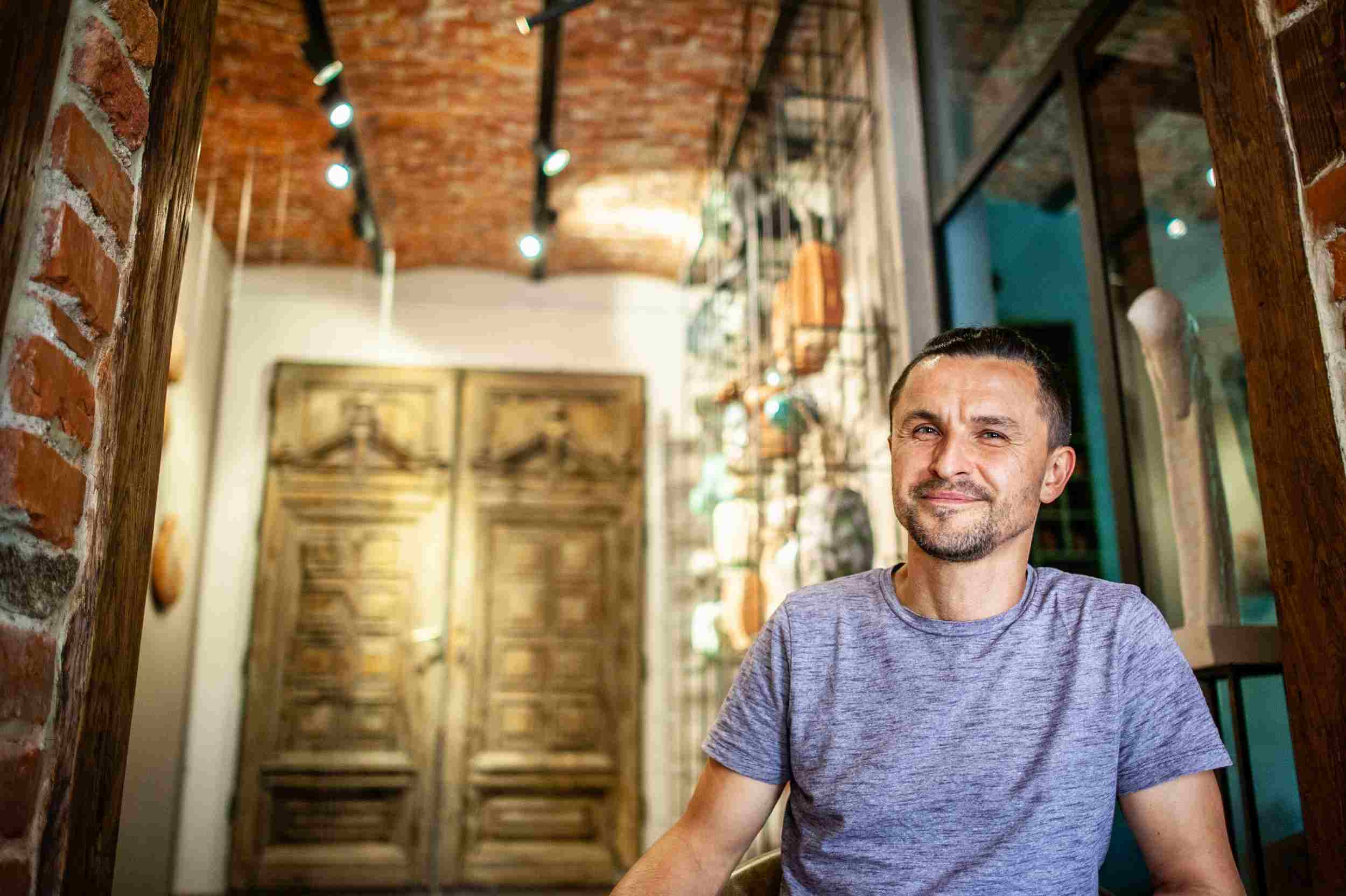
Andriy Voznitskiy
an artist
His roots: Ukrainians, Russians, probably Jews and Mongols
I have always been interested in the subject of family roots. But I would also like to add that my point of view on it changes every 7 to 10 years. So probably what I’m going to tell you now will sound quite differently from me in 7 years.
Some say that “my grandpas and grandmas are my roots” but it seems to me that the real roots of the mankind started over a million years ago. I am convinced that the genetic imprint on the man is done not just 3-4 generations and not 10 and perhaps not even 100. And the nearest 3 generations give us a parenting pattern. I am sure that if my children had been brought up in another family and under other circumstances, they would be quite different people.
I see myself as a leaf on a tree where our parents are branches for the leaves, grandpas and great-grandpas are major branches and the main roots are in the ground.
My ancestors were simple people that worked a lot and loved their land. If I should mention the nearest and dearest, my mom is a fine art restorer and dad is an athlete. My grandpa had a great interest in the roots of our family and even made up a genealogical tree, mom keeps it. I have never thought that I am influenced by my nationality. Moreover, those are patterns I was brought up with and the people that were around me. And what I’m doing now is largely based on that.
We did not have our children’s minds set on the idea they are somehow supposed to be involved in art. My daughter said she wanted to become a doctor but never told us she went in for drawing. As my wife and I saw her sketches we were surprised greatly. Our son will be entering the Faculty of graphical design in the Academy of Arts.
I once dreamed of becoming an archaeologist, exploring earth layers and levels. We only live for moments and it is very important what we are going to leave behind. As for me, nationalities, countries and borders are minor matters. It is more essential to leave the world a better place.
One thing is to be realized: we are also roots for the coming generations. But if fake nonpareils are all we can create, some dump sites of pseudo architecture, then we are but rotten roots. So we must create remarkable and ambitious things around us, for the succeeding generations be able to remember us with pride.
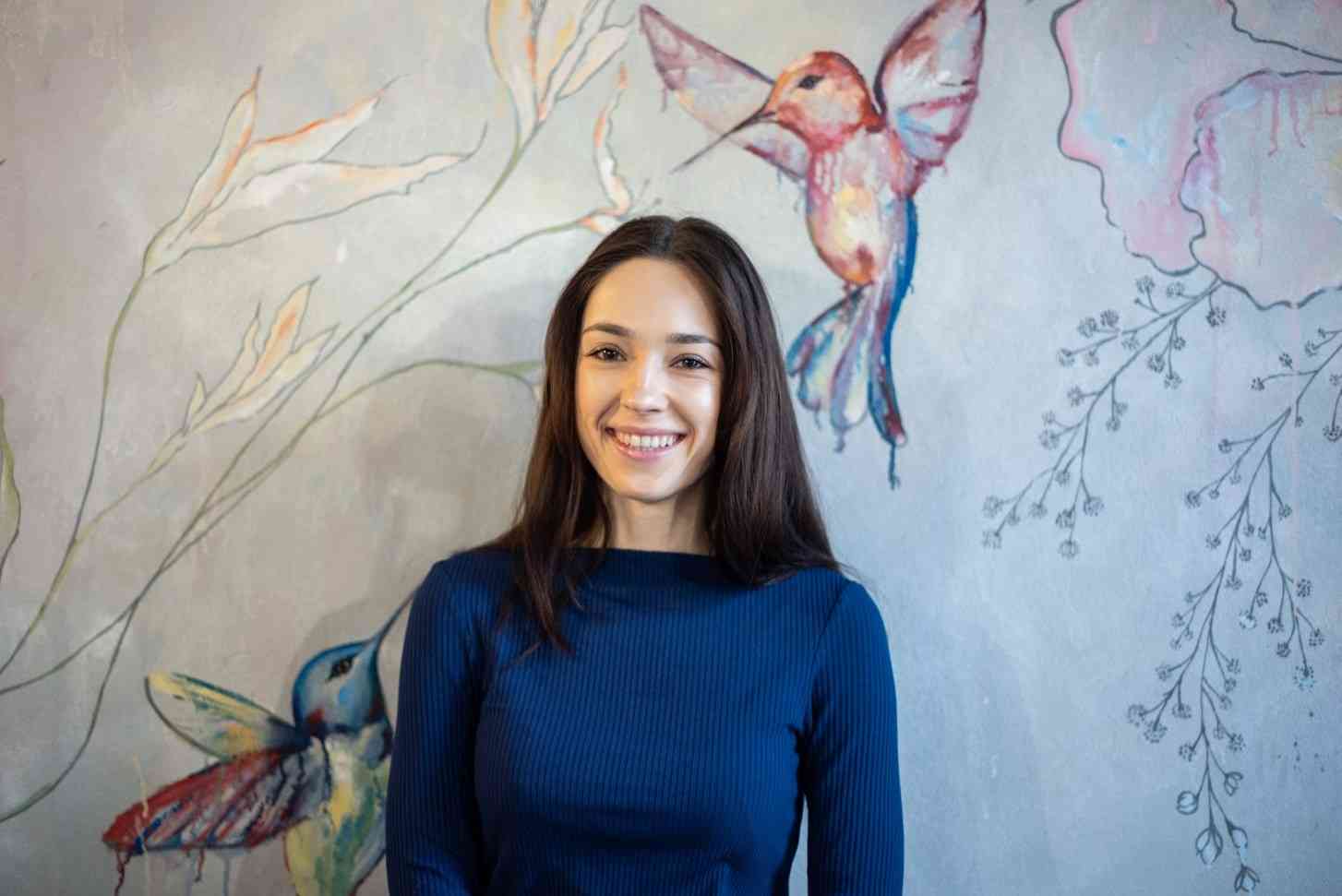
Ruslana Migaly
a female restaurant-keeper, a confectioner
Her roots: Romanians, Ukrainians
I was born in Tiachiv area, in the village of Solotvyno. My father is a Romanian, and my mom is half-Romanian. My mom’s father is a genuine Romanian, and her mom is a Ukrainian from the village of Rusyke Pole, her last name is Gisem. My grandpa was born in Szyget, Romania but they did not live there for long, only till he was seven. Then they had to move to Solotvyno.
Virtually all names in my family are Ukrainized: my grandma’s name Ilie became Illia, then Mihaly became Misha, Anutsa got Ania. I really like Romanian names and as my husband and I were thinking on a name for our son, we tried to pick up a name that would sound in both languages and chose the name Daniel. In Romanian it is spelled without a soft sign.
I love my Romanian surname, Myhali. There was even a well-known writer in Romania with the same name. my married name is Dziuba, a Ukrainian surname, and our son bears it. However, my husband’s grandparents lived in the Urals area, and his grandpa is a Slovenian.
My grandfather used to work at the railway station in Solotvyno. He only completed 3 classes of secondary education but still he can speak Romanian, Hungarian, Ukrainian. He started working already at the age of 7. Now he is 85 years old. He is very talkative and has told me a lot of things, like carols in Hungarian and German, lots of stories.
As modern people, we have grown up a kind of ivory towers, we need lots of conditions and background to achieve something. And as I look at my grandmas and grandpas, I realize that they survived through very hard times but still could speak various languages and fed their families, keeping their households in order and their children well-fed and clean, their cattle all in order and a house built. As I was small, grandpa laid such an oven that it still works perfectly today, and my grandma always cooks a perfect sponge cakes in it. I keep asking her questions like “Well, how do you know what temperature is inside?” It is us who needs fashionable ovens with air cooling and a range of options for perfect conditions, and they had things in a different way.
My parents have always communicated in Russian between each other, and in Ukrainian with me. I spoke Romanian with my grandma and grandpa. The first prayers and carols I learnt were in Romanian. It seems to me that it is essential to let your child enter the world of languages – speak to him and be around for it, turn on audio or video content. It will prevent blocks from shaping in him, that what is called the language curtain. I communicate in Ukrainian, Russian, Romanian, my Spanish and English are rather good, and I have some comprehension of Hungarian.
I am proud of my roots and of being a Romanian. I feel this kind of blood – we are determined and persevering. As I am walking over Uzhhorod, I can see Romanians at once. I don’t know why so but it is a very weird feeling.
I grew up with the thought that cabbage rolls are a Romanian dish. We always cook them very small and it is a special stress for me to cook them (smiling – Editor). Another specialty at our home is the mamalyha (polenta). It is maize grits with lard and bryndza. We used to have a tradition to cook the “tokan ku bryndzia”, and it was our dad only who cooked it. And my grandma cooks a very tasty dish called “shalata di sordit”, which means “a salad for gulping”. She chops some salad, green onions, adds up vinegar and cold water from the water-well.
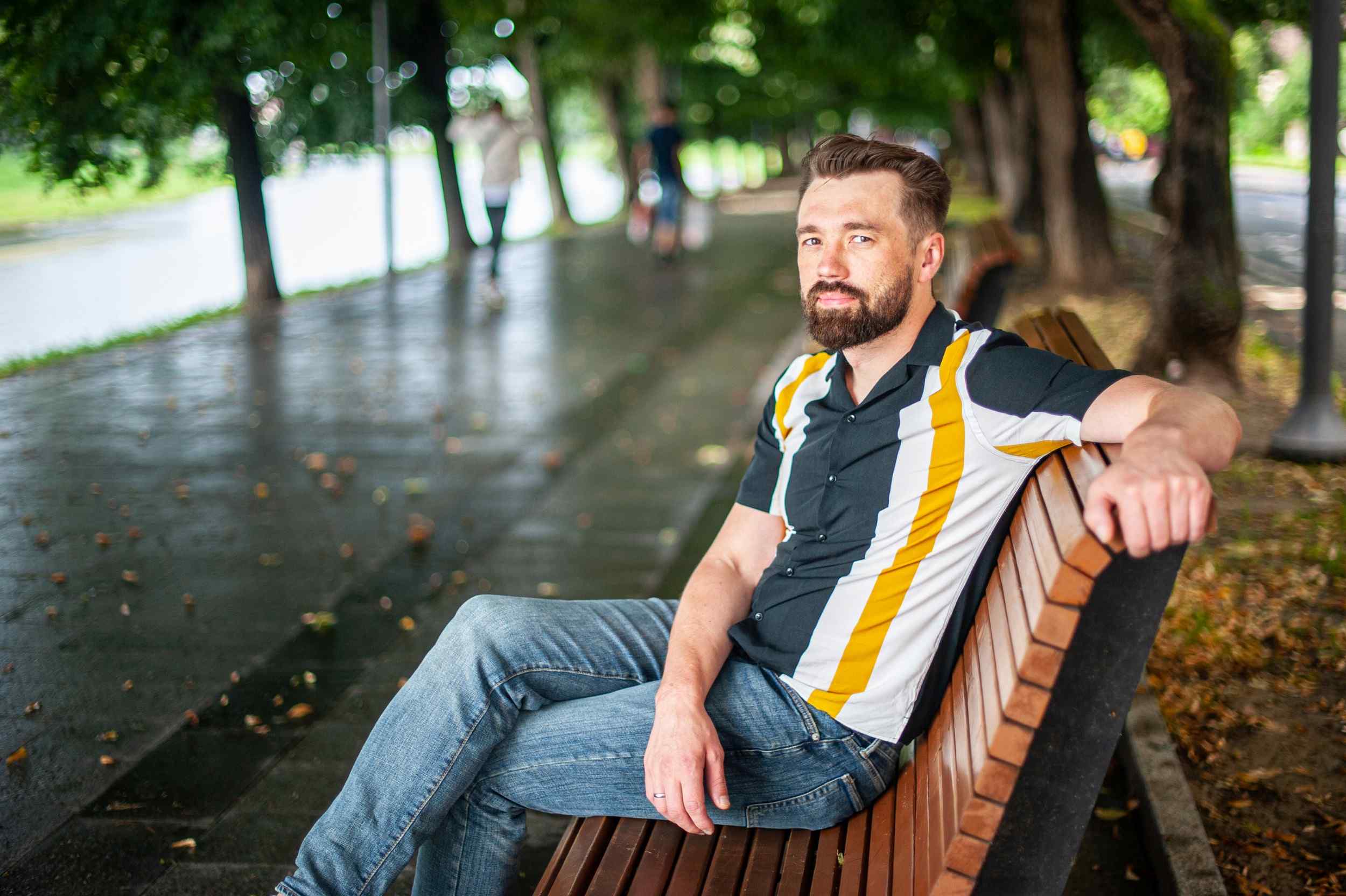
Oleksiy Purtov
a restaurant-keeper, a bartender
His roots: Ukrainians, Russians, Buriats, Polish
I know nothing of my great-grandparents, because they lived at the times called “the times of the silent people”, since people were afraid to tell who they were and where from. Their nationality or origin could become a reason for political repressions.
My grandma on my mother’s side comes from Poland, and grandpa was born in Belarus, I had not met him, only saw him on a photo. My grandma became an orphan at the age of 12 so it is hard to trace my origin further along her side. I met my dad as I was a little boy and I don’t remember him at all. I only saw him once as became an adult, at an age of understanding. My parents divorced quite soon. But I know that by my father’s side all of my relatives come from the Trans-Baikal Territory, namely from the town of Chita, north of Russia.
My grandpa was once on a work travel in Zaporizhhia, in the district of Velikiy (Major) Luh. He brought a lot of wonderful stories and fruit from over there so for my mom Ukraine had always was associated with wealth and prosperity, and a special culture. Even the Ukrainians living in Transbaikalia differed from the local folks – they kept their homes very tidy and clean, with some elements of ethnical decoration in the interior, merry folks they were. Could you imagine that in the north of Russia, with only 2 or 3 months of summertime, and still they managed to grow some cucumbers and tomatoes.
As grandpa left the military service, grandma and him moved to Zaporizhia. That was how my mom, yet small, found herself in Ukraine. And yet she returned to Chita to join the medical institute. There she met my father. He was also studying at the medical. As they were graduates, my elder sister was born. After grandpa died, my grandma insisted that my parents should move to her place, for she needed assistance by that time. So I was born in Zaporizhia.
I can remember little of that city, for my mom got married for a second time and we moved to the Crimea. However, I can remember very well our journey in an overcrowded bus. At that time, being a child, I had an impression that the journey would take us over a month. I was about 9 or so, so I may say that I grew up in the Crimea – in Alupka, in Yalta. A third place was the Partenit Bay, with lots of parks, picturesque views. The Russian nobles once used to live there, and the famous poets of the time, like Pushkin and Lermontov, used to spend their leisure time there.
Being a teenager, I took the Crimea as a true paradise, for I went swimming and walking, but as I grew up, other challenges and tasks raised. After graduating from the ninth form I moved to Zaporizhia, becoming a student at a radio engineering college, getting qualifications of a production designer of integrated circuits. Then I entered the Kyiv Polytechnic Institute. And at that time I started working and took my place at the bar counter. Then I realized that I had to put on hold my studies. Then I moved to Dnipro and it was there that I shaped myself as a personality and an expert. My specialty is hotel and restaurant business and bars.
I have no strong affection to any of the nationalities in my family or the blood in my veins. Unfortunately, in my times the words “patriot” and “patriotism” are very often used for manipulations and exciting hostility. I prefer the Buddist concept, since they don’t look at a man through the prism of his nationality but view him as a human, first of all. It is all the same to me what is your nationality, it is important that you should be a true human.
I have always been interested in the Far East, in particular, Mongolia and China. I have some Buriat roots, so those lands are very close to that. I used to be nicknamed a Chinese or a Mongol as I child. I would like to learn more of my father’s roots. Grandma used to tell me that he was a Buriat, that there is such a nationality. I did not look like children in my neighborhood back in Zaporizhia. So I have been interested in my roots since I was a child.
I think that the Crimea became a true part of me. The land, like Transcarpathia, by the way, is also multinational. Greeks, Tatars, Armenians, Azeris live there. We all were classmates, walked together, and the Crimean Tatar language was taught at school, we took trips to Bakhchisaray. So the brightest moments in my childhood are related with that very place.
Multiculturalism and multinationalism are always close by my side, since I am now living at a very versatile and prosperous area, Transcarpathia. As I had just moved here, I was amazed by the number of nationalities and interesting people living here. It seems that now I am used to it. The numerous languages in the streets that I still take pleasure listening to. And even at our cafés I often meet interesting people communicating in Hungarian, Slovakian, Czech.
As for my kids, I don’t know if it is really essential to tell them anything about nationalities since the very childhood. I simply love them absolutely and teach them love the world in the same way, not paying any attention to what nationality a man is of but just enjoy communicating to him. It is so cool that we are all so different and can live in the same country without fighting.
By Rosana Tuzhanska, specially for Varosh.
This project is carried out with the support of the USA Agency on international development (USAID), 2013-2020. Varosh is an online journal about Transcarpathia. Reprinting and using of the content published at varosh.com.ua is allowed under the condition of an open hyperlink within the first or second passage.
